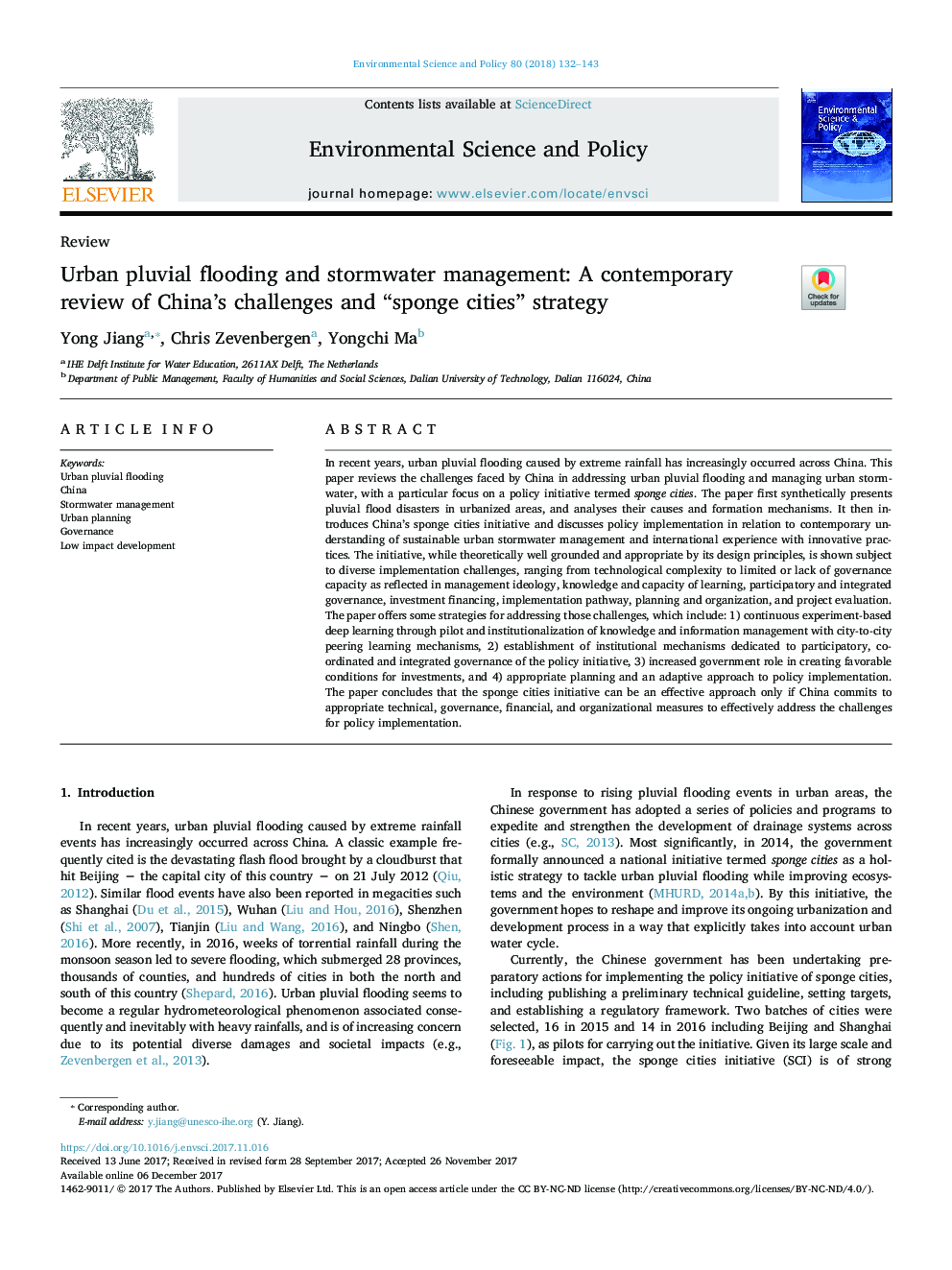| کد مقاله | کد نشریه | سال انتشار | مقاله انگلیسی | نسخه تمام متن |
|---|---|---|---|---|
| 7466233 | 1485028 | 2018 | 12 صفحه PDF | دانلود رایگان |
عنوان انگلیسی مقاله ISI
Urban pluvial flooding and stormwater management: A contemporary review of China's challenges and “sponge cities” strategy
ترجمه فارسی عنوان
سیلاب و مدیریت فاضلاب شهری: بررسی های معاصر چالش های چینی و شهرهای شهر اسفنجی استراتژی
دانلود مقاله + سفارش ترجمه
دانلود مقاله ISI انگلیسی
رایگان برای ایرانیان
کلمات کلیدی
سیلاب پلویوسی شهری، چین، مدیریت طوفان، برنامه ریزی شهری، حکومت، توسعه کم اثر،
ترجمه چکیده
در سال های اخیر، سیلاب های پر جمعیت شهری ناشی از بارندگی شدید در سراسر چین به طور فزاینده ای رخ داده است. در این مقاله چالش هایی که چین با آن مواجه است، در زمینه رسیدگی به سیل زدایی و مدیریت شهری است. این مقاله ابتدا به طور مصنوعی بلایای سیلاب پلویو در مناطق شهری ارائه می دهد و علل و مکانیزم های شکل گیری آنها را تحلیل می کند. پس از آن، ابتکارات شهرستانهای اسفنجی چین را معرفی می کند و در مورد اجرای سیاست ها در رابطه با درک معاصر مدیریت پایدار شهری شهری و تجارب بین المللی با شیوه های نوین بحث می کند. این ابتکار عمل، در حالی که به لحاظ نظری به خوبی بر اساس اصول طراحی و مناسب مطابقت دارد، با توجه به چالش های مختلف اجرایی، از پیچیدگی های تکنولوژیکی تا محدودیت یا عدم توانایی حکومتداری که در ایدئولوژی مدیریت، دانش و ظرفیت یادگیری، حکومت مشارکتی و یکپارچه، تامین مالی سرمایه گذاری، راه پیاده سازی، برنامه ریزی و سازمان، و ارزیابی پروژه. در این مقاله برخی از استراتژی ها برای رسیدگی به این چالش ها ارائه می شود که عبارتند از: 1) یادگیری عمیق مبتنی بر آزمایش مداوم از طریق خلبان و نهادینه سازی مدیریت دانش و اطلاعات با مکانیسم های یادگیری از طریق شهر به شهر؛ 2) ایجاد سازوکار سازمانی اختصاص یافته به مشارکت، نظارت هماهنگ و یکپارچه از ابتکار سیاست، 3) افزایش نقش دولت در ایجاد شرایط مطلوب برای سرمایه گذاری، و 4) برنامه ریزی مناسب و یک رویکرد انطباقی برای اجرای سیاست. این مقاله نتیجه گیری می کند که ابتکار شهرداری ها می تواند یک رویکرد موثر باشد تنها در صورتی که چین قصد دارد اقدامات فنی، حکومتی، مالی و سازمانی را به طور موثر در زمینه چالش های اجرای سیاست انجام دهد.
موضوعات مرتبط
مهندسی و علوم پایه
مهندسی انرژی
انرژی های تجدید پذیر، توسعه پایدار و محیط زیست
چکیده انگلیسی
In recent years, urban pluvial flooding caused by extreme rainfall has increasingly occurred across China. This paper reviews the challenges faced by China in addressing urban pluvial flooding and managing urban stormwater, with a particular focus on a policy initiative termed sponge cities. The paper first synthetically presents pluvial flood disasters in urbanized areas, and analyses their causes and formation mechanisms. It then introduces China's sponge cities initiative and discusses policy implementation in relation to contemporary understanding of sustainable urban stormwater management and international experience with innovative practices. The initiative, while theoretically well grounded and appropriate by its design principles, is shown subject to diverse implementation challenges, ranging from technological complexity to limited or lack of governance capacity as reflected in management ideology, knowledge and capacity of learning, participatory and integrated governance, investment financing, implementation pathway, planning and organization, and project evaluation. The paper offers some strategies for addressing those challenges, which include: 1) continuous experiment-based deep learning through pilot and institutionalization of knowledge and information management with city-to-city peering learning mechanisms, 2) establishment of institutional mechanisms dedicated to participatory, coordinated and integrated governance of the policy initiative, 3) increased government role in creating favorable conditions for investments, and 4) appropriate planning and an adaptive approach to policy implementation. The paper concludes that the sponge cities initiative can be an effective approach only if China commits to appropriate technical, governance, financial, and organizational measures to effectively address the challenges for policy implementation.
ناشر
Database: Elsevier - ScienceDirect (ساینس دایرکت)
Journal: Environmental Science & Policy - Volume 80, February 2018, Pages 132-143
Journal: Environmental Science & Policy - Volume 80, February 2018, Pages 132-143
نویسندگان
Yong Jiang, Chris Zevenbergen, Yongchi Ma,
